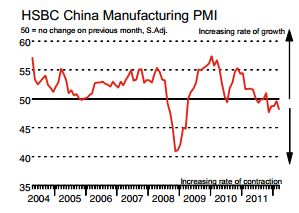US markets displayed a notable move to the downside in morning trading on Wednesday due to continued worries about the financial situation in Europe, which came as European leaders held a closely watched summit in Brussels. However, stocks staged a significant recovery over the latter part of the trading day which was attributed to reports out of the European summit regarding the steps that the leaders are willing to take to boost economic growth. European markets finished solidly to the downside on Wednesday reversing the gains from the previous two trading days on the back of concerns over the situation in Greece.
With little direction from the European Leaders and harsh words from the IMF, the World Bank and the OECD markets will continue in risk aversion mode as currencies continue to seek the safe haven play and avoid anything European.
The drama in the Eurozone continues to weigh on markets, with today’s press reports featuring prominent former ECB board member Lorenzo Binhi Smaghi discussing a “war game”- style simulation of a Greek withdrawal from the common currency. Binhi Smaghi said that “leaving is difficult” and concluded from the simulation exercise that leaving the euro “is not the answer to their (Greece’s) problems.” We agree, however markets were not heartened as his mere comment provided a further sign that serious people are contemplating at least the possibility of a Greek exit from the Eurozone.
Euro Dollar
EURUSD (1.2582) The euro continues to weaken, breaking through the January 2012 low of 1.2624 and opening the door to the psychologically important 1.2500. EUR remains historically strong, well above its average level since inception of 1.2145 and significantly stronger than the 2010 low of 1.1877.
We expect EUR to trend lower; however do not think EUR will collapse. The combination of repatriation flows, value in Germany, the potential for the Fed to turn to QE3 and ongoing market belief that authorities will provide various levels of backstop support. Accordingly, we have made no change to our year‐end target of 1.25; though recognize that EUR could fall below this level in the near‐term.
The Sterling Pound
GBPUSD (1.5761) Sterling hit a two-month low against the dollar on Wednesday as persistent concerns about a possible Greek exit from the euro prompted investors to sell what they see as riskier currencies, and poor retail sales data added to a shaky UK growth outlook.
The pound climbed versus a broadly weaker euro as hopes a European Union summit might make progress in tackling the debt crisis faded, while sources told Reuters euro zone states have been told to make contingency plans for Greece quitting the currency bloc.
Against the dollar, sterling was last down 0.4 percent at $1.5703, paring losses after hitting a session low of $1.5677, its lowest since mid-March. It tracked a sharp fall in the euro, which hit a 22-month trough against the dollar as investors retreated to safe-haven assets.
Asian –Pacific Currency
USDJPY (79.61) The JPY is up 0.7% from yesterday’s close and outperforming all of the majors as a result of continued risk aversion, and as market participants consider the slight changes to the BoJ’s statement following its most recent meeting. The BoJ left policy unchanged, at 0.1% as anticipated, but dropped the key term ‘powerful easing’ from its policy statement, reducing expectations for additional asset purchases in the near term. Japan’s merchandise trade figures have also been released and indicate a slowing level of activity given the fall in growth rates for both exports and imports, with the latter remaining elevated relative to the former.
Japan’s trade balance will remain challenged by the need for energy imports given the fall in nuclear power production.
Gold
Gold (1559.65) futures have slumped for a third day as worries about the fallout from a potential Greek exit of the euro zone pushed investors to pile into the US dollar.
The euro sank to its lowest level against the US dollar since July 2010, as investors continued to shed perceived risky assets on the chance that European leaders would be unable to stem the apparent worsening of the euro zone’s debt crisis.
The European Central Bank (ECB) and euro-zone countries are stepping up efforts to prepare contingency plans for a Greek exit, sources told
The most actively traded gold contract, for June delivery, on Wednesday fell $28.20, or 1.8 per cent, to settle at $1,548.40 a troy ounce on the Comex division of the New York Mercantile Exchange. Futures had traded lower earlier in the day, threatening to end below last week’s 10-month settlement low of $1,536.60 an ounce.
Crude Oil
Crude Oil (90.50) prices have slumped, falling to a six-month low under $US90 in New York as the US dollar rallied on eurozone debt tensions.
Investors sought out the relative safety of the greenback as fears grew over the outlook for the eurozone. With an agreement between Iran and the Energy Commission, geopolitical tensions have fallen aside. And with the higher than expected climb in inventories reported this week, crude oil has little to support price increase.
As the euro dived to a 22-month low, New York’s main contract, West Texas Intermediate crude for delivery in July, slid $US1.95 to $US89.90 a barrel – the lowest level since October.
Brent North Sea crude for July tumbled $US2.85 to $US105.56 a barrel in late London deals.



